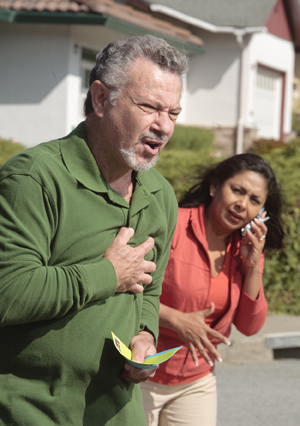Symptoms of a Heart Attack
A heart attack is also known as acute myocardial infarction, or AMI. It's an urgent message from your heart that it’s starved for oxygen. When a clot blocks a blood vessel feeding the heart (coronary artery), oxygen-rich blood can’t reach a part or all of your heart. Then tissues of the heart muscle start to die. This causes symptoms of a heart attack. The sooner you get to the hospital, the sooner treatment can start to help save your life and your heart.
Warning signs of a heart attack

-
Chest discomfort. With most heart attacks, there's discomfort in the center of the chest. This can last more than a few minutes. Or it can go away and come back. It can feel like uncomfortable pressure, squeezing, burning, fullness, tightness, or pain. It's often described as something heavy sitting on your chest.
-
Discomfort in other parts of the upper body. Symptoms can include pain or discomfort in 1 or both arms, shoulders, the back, neck, jaw, or stomach.
-
Shortness of breath. This may occur with or without chest discomfort.
-
Other signs. These may include breaking out in a cold sweat, upset stomach (nausea), or feeling lightheaded.
For women
Like men, women most often have chest pain or discomfort as a heart attack symptom. But women are a little more likely than men to have some of the less common symptoms. These include:
-
Shortness of breath
-
Abnormal tiredness
-
Lightheadedness
-
Heartburn
-
Nausea and vomiting
-
Back pain
-
Jaw pain
For older adults
Older adults may also have different symptoms. These include:
-
Fainting (syncope)
-
Weakness
-
Confusion (delirium)
These symptoms should be looked at right away. Ignoring them can lead to critical illness or death.
For people with diabetes
If you have diabetes, high blood sugar can damage nerves in your body over time. This may keep you from feeling pain caused by a heart problem, leading to a “silent” heart problem. If you don’t feel symptoms, you're less able to get treatment right away. Talk with your healthcare provider about how to lower your risk for silent heart problems.
Call 911
Don’t be afraid to call 911, even if you’re not sure you're having a heart attack. If you don’t know the cause of your symptoms, assume it’s a heart attack. Play it safe and call 911 right away. Don'tdrive yourself to the emergency room (ER).
If you think someone else is having a heart attack, call 911 right away instead of driving them to the ER. After you call 911, they'll tell you what to do. The 911 dispatcher may tell you to give the person aspirin while waiting for help to arrive. If the dispatcher doesn’t tell you to do this, don't give the person aspirin. Aspirin can be dangerous in certain cases.
When you've had a past heart attack
People who've had one heart attack are at risk of having another. Your healthcare provider may prescribe medicine such as nitroglycerin to take for chest pain. You may also need medicine to lower your heart rate and blood pressure. This is to prevent angina and another heart attack. Remember to take any medicines your provider has given as directed. Don't stop these medicines without talking with them first.